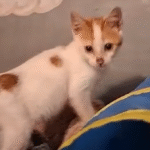When your heart breaks, you might think you’re suffering in silence. You believe nobody knows the depth of your pain until those first tears begin to fall. Yet your feline companion already knows something profound is happening within your emotional world.
Cats are remarkably intuitive creatures that can recognize human emotions through both auditory and visual observations, developing a general mental representation of the emotions of their social partners. Their ability to detect your heartbreak begins long before your sorrow becomes visible to the human eye. Let’s explore the fascinating ways your cat becomes your first emotional responder.
Your Cat Reads Your Silent Body Language Like a Book

Cats are exceptional at reading visual signals, from the slump of our shoulders to the furrow of our brows, detecting the subtle changes in our facial expressions that accompany sadness. Before you consciously register your heartbreak, your body begins communicating through microscopic shifts that your cat notices immediately.
Cats pay close attention to our body language because we carry ourselves differently when we’re sad, becoming quieter, smaller as we slump or curl up, and more open to calming behaviors like gentle petting. Cats are particularly adept at recognizing the body language associated with low moods, such as a hunched posture or lack of energy.
Your feline friend recognizes these subtle changes as distress signals. Slouched posture, slow movements, or sitting still may signal to a cat that something is wrong. This silent communication system between you and your cat operates continuously, making them extraordinarily sensitive to your emotional shifts.
They Detect Chemical Changes Through Their Extraordinary Sense of Smell

A cat’s sense of smell plays a crucial role in their ability to detect human emotions, as our bodies may release chemical signals that could potentially be detected by a cat’s highly developed olfactory system. This remarkable ability allows them to smell heartbreak in ways we never imagined possible.
Changes in pheromones, caused by stress or sadness, can alert cats something is different. Cats have a highly developed sense of smell and can pick up on the pheromones that we emit when we’re feeling sad, anxious, or scared, especially when our bodies release pheromones that cats can detect during times of stress or anxiety.
When people experience emotional distress and the decomposition of cells causes chemical changes in the body, cats can sense the hormonal changes using their olfactory pathway, detecting changes in hormones and pheromones. Changes in stress hormones may potentially affect scent in ways that cats might be able to detect through their sensitive noses.
Your Voice Betrays Your Emotions Even When You Try to Hide Them

Cats are highly sensitive to auditory signals, as the tone and pitch of our voices can convey information about our emotional state, often becoming softer, slower, and more monotonous when we’re feeling sad, which cats can pick up on. Even your attempt at normal conversation reveals emotional undercurrents to your perceptive pet.
Cats can distinguish human emotional state based on the tone of voice, or if the human is making sad or happy sounds. Higher-pitched excited voices, or lower tones when someone is angry, cue the cat into which emotion is present.
Our tone of voice gives away a lot about how we are feeling. When we’re happy, we tend to speak in a higher pitch with a smiling face, but when we’re sad or upset, our voices may be lower, and cats can pick up on these subtle changes in our vocal cues. Your cat becomes an expert at interpreting these vocal variations long before your heartbreak becomes obvious to others.
They Notice Changes in Your Daily Routines and Behavior Patterns

Cats build patterns based on how their humans behave, and any deviation from this routine signals a change in emotional state. When heartbreak strikes, your established patterns shift in ways that immediately catch your cat’s attention.
If you’re lounging around more than usual or pacing anxiously, your cat will likely notice, as cats are keen observers. Cats are best at picking up on the emotions of their human family members because they know them best and are much more familiar with your normal body language and behavior.
Your feline companion becomes a living record of your habits, making them incredibly sensitive to even minor behavioral changes. Cats are extremely sensitive to change, as anyone who has ever moved house with a cat or even dared to change the furniture around would know. This sensitivity extends to your emotional routines as well.
They Read Your Facial Expressions Like an Open Diary

Studies have shown that cats can recognize facial cues, and research suggests cats may be able to distinguish between different human facial expressions and may react differently based on what they read on our faces. Your face becomes an emotional canvas that your cat interprets with remarkable accuracy.
It makes sense that they notice changes in our faces when we’re sad, angry, and so on, because that’s where we are most expressive. Research indicates that cats may be able to recognize human facial expressions and potentially differentiate between emotional states, and while direct studies on cats sensing tears are limited, their ability to read cues implies they notice when something is emotionally off.
Research revealed that cats react differently based on their owner’s facial expressions. When owners smiled, cats were more likely to exhibit affectionate behaviors like purring and rubbing against them, but they tended to avoid their owners when they frowned. Your cat becomes fluent in reading your facial vocabulary of pain.
They Monitor Your Physical Contact and Energy Levels

Cats often rub against their owners or snuggle up on their laps as a sign of affection, but when we’re feeling depressed, anxious, or upset, our body language changes accordingly, perhaps becoming more rigid or downbeat, and we may experience a lower heart rate or decrease in body temperature when we’re in a sad state, which cats may be able to pick up on through physical contact.
Your cat’s sensitivity to physical changes extends beyond temperature and tension. Cats are very good at reading facial expressions and especially when they are accompanied by vocalization. They notice when your usual energy patterns shift, when your movements become heavier, or when your typical responsiveness diminishes.
When you’re sad, your speech changes and you might make other noises like sniffling or crying, and your body language will also change as you may be less active, more hunched, and generally seem weighed down with life. These physical manifestations of heartbreak register immediately with your observant feline companion.
They Demonstrate Emotional Contagion and Mirror Your Feelings

Research has found that owners and their cats mirror each other’s well-being and behavior, and surveys suggest that many cat owners report their cats appear stressed when they themselves are stressed. This emotional mirroring creates a powerful bond that allows cats to sense your heartbreak through shared emotional experiences.
Emotional contagion refers to the process of mimicking or catching the emotions of another individual, often without conscious awareness, occurring through nonverbal cues, such as facial expressions and body language, as well as through verbal communication and tone of voice, leading to the emotional state of a pair or group of individuals becoming synchronized.
Researchers have studied the human-cat bond and concluded that our feline companions are keenly attuned to and deeply influenced by our interactions, as a close bond with an owner changes how a cat responds, and cats often show behaviors that match our feelings. Your heartbreak becomes their heartbreak through this remarkable emotional connection.
Understanding how deeply your cat senses your emotional world reveals the extraordinary bond you share. These findings challenge the stereotype of cats as indifferent to human emotions, as while they may not express their attachment in the same overt ways as dogs, cats are clearly tuned into the emotional states of their humans and not only recognize human emotions but may also respond to them in ways that reflect their own emotional states.
The next time your heart begins to break, remember that your feline companion has already sensed your pain and stands ready to offer their unique form of comfort. What insights about your cat’s emotional intelligence have surprised you the most?






